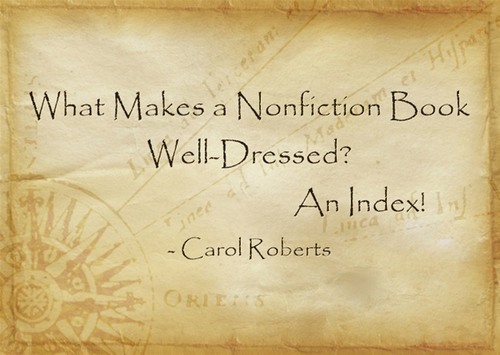
Carol Roberts is an indexer of 24 years, currently expanding the trade-book side of her business. She has more than 800 books under her belt, on subjects as diverse as poker, cooking, animal rescue, quality control, biography, Zen Buddhism, creativity coaching, and self-help. Have a book that needs an index or want a peek at her work? Visit her website: RobertsIndexing.com.
In today’s tough book market, an index is no mere accessory. Having an index can make or break your book sales, when you consider that many of your competitors don’t even bother to index their books.
Why does your book need an index? You’ve researched your book, written the content and table of contents, and had the book edited. Isn’t that enough? Adding an index will help you sell more books because:
- an index adds the polish potential buyers expect from traditionally published books,
- readers need it to find information quickly and painlessly,
- many libraries don’t acquire a book unless it has an index,
- and experts in your field will use the index to judge the book’s completeness and your competence.
Do you need a professional indexer? Deciding whether to hire an indexer is a lot like deciding whether to hire a plumber. Your decision will be based on how much you know about the work, whether you have the time, whether you enjoy it, and so on. Learning how to index a book takes time, which you could be using to write your next book!
Isn’t indexing automated these days? Why not use concordance software to write the index?
A computer can no more create an index than a pencil can write a book. #nonfictionauthors
At best the “automated” approach yields a concordance (an alphabetical list of the nouns in the book), not an index. If your book includes metaphors like “X is no walk in the park,” the concordance will include entries for “walk” and “park.” If p. 57 says “Smith had a big mouth,” and p. 112 talks about the “mouth of the Mississippi River,” there will be an entry like this: “mouth, 57, 112.” There is no substitute for a human indexer, and you could well spend hours massaging the concordance into a proper index.
If you decide to hire a pro, how does it work? When an author contacts me, they usually want to know two things right off the bat: whether I’m available and how much it will cost. The first step for me is to find out the subject and length of the book, when the final pages will be ready for indexing, how soon they need the index, what audience the book is for (e.g., professors, students, general audience), and how dense the book is. The fee I quote will be based on all those factors.
If the author and I agree on all the terms, I’ll work from a pdf file of the whole book, when it’s ready. I’ll read the book, index it, and send the author a draft of the index, along with instructions for making revisions and a list of any typos I spotted along the way. I’ll input the author’s changes, making sure everything conforms to indexing standards and the publisher’s specs, if there is a publisher.
My indexing process is designed to take the worry out of indexing and let the author relax.